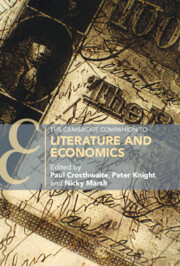Book contents
- The Cambridge Companion to Literature and Economics
- The Cambridge Companion to Literature and Economics
- Copyright page
- Contents
- Contributors
- Introduction
- Part I Histories and Critical Traditions
- Part II Contemporary Critical Perspectives
- Chapter 8 The Economy of Race
- Chapter 9 American Literature and the Fiction of Corporate Personhood
- Chapter 10 Political Economy, the Family, and Sexuality
- Chapter 11 The Literary Marketplace and the Rise of Neoliberalism
- Chapter 12 World-Systems and Literary Studies
- Chapter 13 Crisis, Labor, and the Contemporary
- Chapter 14 Speculative Fiction and Post-Capitalist Speculative Economies: Blueprints and Critiques
- Part III Interdisciplinary Exchanges
- Further Reading
- Index
- Cambridge Companions To …
Chapter 10 - Political Economy, the Family, and Sexuality
from Part II - Contemporary Critical Perspectives
Published online by Cambridge University Press: 28 July 2022
- The Cambridge Companion to Literature and Economics
- The Cambridge Companion to Literature and Economics
- Copyright page
- Contents
- Contributors
- Introduction
- Part I Histories and Critical Traditions
- Part II Contemporary Critical Perspectives
- Chapter 8 The Economy of Race
- Chapter 9 American Literature and the Fiction of Corporate Personhood
- Chapter 10 Political Economy, the Family, and Sexuality
- Chapter 11 The Literary Marketplace and the Rise of Neoliberalism
- Chapter 12 World-Systems and Literary Studies
- Chapter 13 Crisis, Labor, and the Contemporary
- Chapter 14 Speculative Fiction and Post-Capitalist Speculative Economies: Blueprints and Critiques
- Part III Interdisciplinary Exchanges
- Further Reading
- Index
- Cambridge Companions To …
Summary
This chapter focuses on some of the principal ways in which the family has been viewed, or theorized, in political-economic thought, but focuses in particular on the legacy of Edmund Burke’s conservative defense of that institution against radical challenge on the grounds that inheritance materially underpins moral and cultural continuity. Tracing the the complex evolution of this essentially elitist argument in relation to Malthusianism, as well as through both the discourse of eugenics and literary responses to the emergence of a “mass society,” the chapter also highlights the role of Burkean traditions in affirming an orthodox heteronormativity against sexual liberationist movements, theorists, and writers. Ultimately, though, the conclusion demonstrates that the commodification of queer sexuality has contributed to new forms of sociocultural tension at the heart of our contemporary politics.
- Type
- Chapter
- Information
- The Cambridge Companion to Literature and Economics , pp. 163 - 178Publisher: Cambridge University PressPrint publication year: 2022

